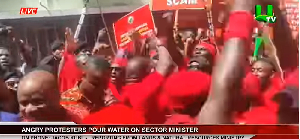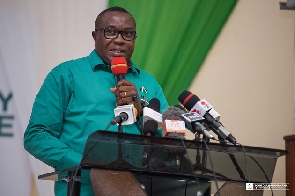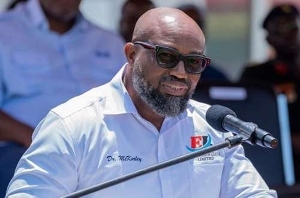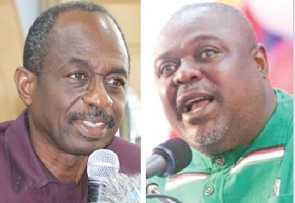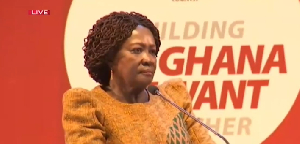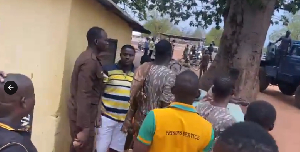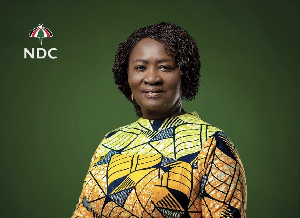During their press briefing of February 11, 2021, spokespersons for the legal team of petitioner John Dramani Mahama, claimed that the Electoral Commission was refusing ‘accountability’ in the ongoing election petition.
Led by former Attorney General Marietta Brew Appiah-Oppong, the petitioner's spokespersons cited a number of instances during the trial when the EC had refused to 'respond' to their applications before the courts.
But speaking on the issue, Appiah-Oppong made comments that suggested that the EC and its chair were evading accountability. She said: “We have an EC who when a request for information was served on them in the past, they refused to respond. We have an EC who was requested to answer interrogatories, they refused to respond.
“We have an EC that was served with a notice to admit facts, they refused. We have an EC that was asked to produce documents relating to the election, they also refused. That is the kind of EC we are dealing with. Where are the principles of accountability? When is this EC going to be accountable?” she quizzed.
GhanaWeb looked into the three different areas she raised relative to accusing the EC of not being accountable.
Every area the former Attorney General raised was the subject of oral arguments in open court and has been backed by a definitive ruling by the bench.
We present the request and subsequent ruling. It belies the claim that the EC is not being accountable.
Admission of facts application
On 18th January, counsels for the petitioner applied to the court requesting the EC Chairperson, Jean Mensa, to admit to certain facts. The application was flatly opposed by lawyers for the respondents.
Among other issues, he wanted the EC Chair to admit that she has since not made any other declaration of results. That she admits that the figures and percentages she announced the January 9 declaration if collated will come to 100.3% instead of 100%.
That she further admits that the subsequent correction of results in statements issued by the EC is different from what candidates obtained as captured in the summary of results sheets published by the EC.
After hearing oral arguments from both sides, there was a unanimous decision by the judges, to throw out the motion by Lawyer Tsatsu Tsikata on grounds that, it was irrelevant and does not relate to the issue between the parties involved.
The ruling further added that the precedent on which the petitioner’s lawyer based his arguments was amended thus, does not hold.
The issue of interrogatories
On January 19, 2021, the Supreme Court heard and subsequently dismissed a motion of interrogatories filed by the lawyers of the petitioner seeking to compel the EC chairperson, Jean Mensa, to admit that she made errors during her declaration of election results. The motion was filed the day before.
The apex court unanimously ‘threw out’ the application after identifying that the interrogatories were irrelevant to the case.
The application was opposed by both respondent lawyers. Justin Amenuvor for the EC (first respondent) and Akoto Ampaw for president Nana Addo Dankwa Akufo-Addo (second respondent).
The petitioners applied the same day for a review of the court ruling. On 28th January, the court again dismissed it on grounds that the petitioner has not satisfied the court with exceptional circumstances to warrant the grant of the application.
Petitioners request for information, documents
In early February, petitioners filed an application to inspect documents of the Electoral Commission. They requested from the court leave to permit them to inspect specific documents of the EC.
Among others; the originals of all constituency presidential election result collation forms (form 9), the originals of all constituency presidential election results summary sheets (form 10) and the originals of all the regional presidential election collation forms (form 11).
The others are request for originals of the regional presidential election results summary sheets (form 12), original declaration of the presidential results form (form 13) and the records of the alleged update to the purported declaration of presidential election results on 9th December 2020, and the results of four (4) constituencies in the Greater Accra Region.
The court in its ruling said the petitioner failed to demonstrate that he had no copies of the documents in question. The court said the witnesses of the petitioner had also admitted on oath to having copies of the documents.
Chief Justice Anin-Yeboah said the application and whether it would be granted was subject to the discretion of the court and not as of rights. He added the application did not also raise that it had no copies of the original documents hence the dismissal.
From the foregoing, it is clear that the actions of the EC and its chair has been backed by judicial rulings allowing them to not respond to the different requests that the petitioners have filed over the course of the trial.
Current status of the case
The court as at today has directed parties in the trial to file their respective addresses simultaneously by February 17. The next public sitting is scheduled for February 18, 2021. On that day, lawyers in the case will make their respective legal arguments.
The petitioner, on February 11, applied to reopen his case in order to compel the EC chair and witness for the second respondent to mount the witness box to be cross-examined. The court had earlier ruled that the petition was a civil trial, and it could not compel a party to mount the witness box.
According to the seven-member panel, the court's inherent jurisdiction did not require that it extended its powers beyond what the law had stated.
“We are reminded to state that our jurisdiction invoked in this election petition is limited jurisdiction clearly circumscribed by law. We do not intend to extend our mandate beyond what the law requires of us in such petitions brought under article 67 Clause 1.
“Simply put, we are not convinced and will not yield to the invitation being extended to us by the Counsel for the Petitioner to order the respondents to enter the witness box in order to be cross-examined,” the court ruled.
Meanwhile, lead counsel for the petitioner says he will file for a review over the Supreme Court’s decision against the cross-examination of the EC and second respondent’s witnesses.
He also said they would file for a subpoena of the EC Boss and that would be done formally through a motion.
The Supreme Court presided over by Chief Justice Kwasi Anin Yeboah, said the Court was ready and could not prevent the Petitioner from filing anything before it.

